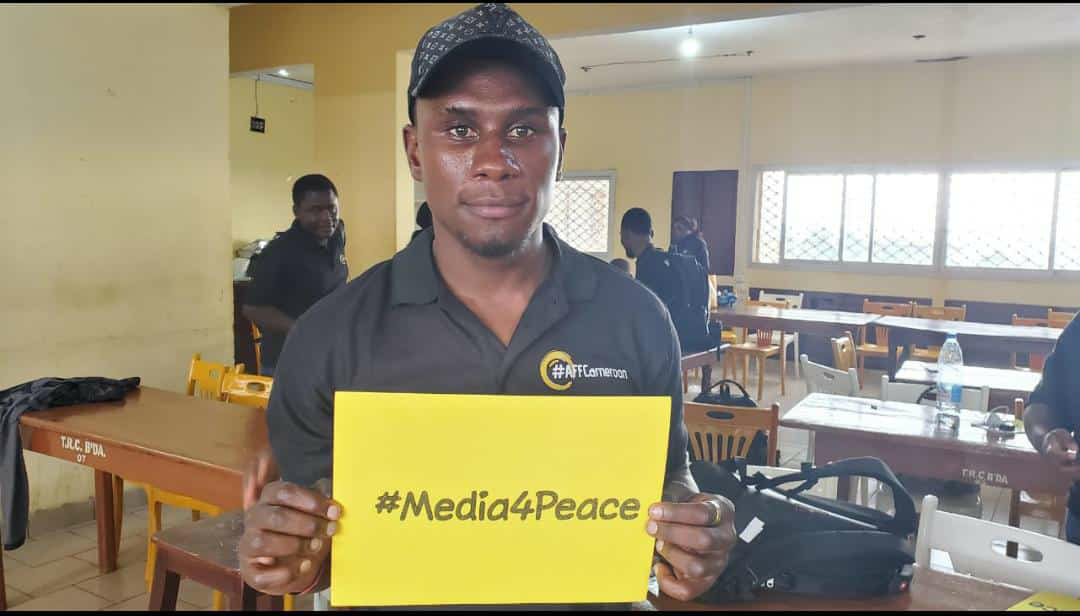The Colbert Factor:
It was one fateful October month of 1989, while a High School student at St. Bede's College, Ashing-Kom, and hype-manning during 'Socials' (for the 'listening and dancing pleasure' of the whole student body), that news reached me of the death of my lovely father, Jude Thaddeus Fulai Biyong. Immediately, I had to stop everything else that evening, and arranged for exit papers to be off to Fundong, and then, Muteff, for the burial ceremony the very next day.

As it was (and is) the tradition in Komland, a vivid symbol of having successfully buried one's parent was the firing of guns after interment. Knowing just too well that even at that age I had never held (talk less of firing) a gun, my uncles carefully arranged to load the dane gun, fasten it to a coffee tree stem, before encouraging me to pull the trigger into the air. Even then, it still took me more than five minutes to muster courage and turn my face away, before reluctantly pulling out on the trigger. Even as the sound was not as loud as that of other elderly villagers, seeing the fright in me, the family just concluded I had done the essential and so, could go my way.
The memory of that particular day and scene has never left me, especially each time I come across children in the two English speaking regions of Cameroon (and as young as 11) manipulating even sophisticated guns and machinery, and in the process, 'wasting' people's lives.
There is no gainsaying the fact that there has been a marked difference between the use of the gun in the 'graffi' culture and that of America. While in America children would grow up in the gun culture (capable of shooting and killing), in the Grasfields culture, it wasn't easy for a child to even have access to a gun, talk less of being able to pull at the trigger.
Before the outbreak of the conflict in the two English speaking regions of Cameroon, the gun (sword), had been the symbol of protection, royalty, communal authority, religion and mysticism. Metaphysically, the gun in the Western Grasfields had not only represented the penetrating power of the intellect (and craftsmanship), but more importantly, a cultural artefact with the much broader meaning and significance it had to its bearer.
Take the sword to be the gun, in the present happenstances.
"Live by the sword, die by the sword", is a proverb in the form of a parallel phrase, derived from the gospel of Matthew (Mathew 26.26:52): "Then Jesus said unto him, Put your sword back in its place: for all those who draw the sword will die by the sword." This has also been interpreted to mean that those who view war/violence as a solution to their problems would likely die a violent death.
Although some Bible scholars claim that the one reason Jesus ordered his disciple to put back the sword was because the two swords could not possibly have been enough to defend him from his pending arrest, trial and execution, and therefore thwarting his wish to fulfill a prophecy; the sword as presented by Paul in Ephesians chapter 6, is rather the sword of the spirit, represented by the word of God.
Although since Sunday May 7, 2023, that budding journalist, Anye Ndeh Nsoh, was brutally cut down in his prime at his Ntarikon-Bamenda neighborhood as he moonlighted as hype-man for Don Simon Snack, many have been calling for the tracking down of his killers; they know just too well that the only sword capable of doing that is God's sword - prayers. The Bible refers to it as not just another weapon, but the greatest of all weapons as it infuses the rest of the armor with the power needed to fight the enemy. It is the one thing Apostle Paul asked the Ephesians to do for him: pray.
As the rest of the Journalists Anye Ndeh Nsoh has left behind in the two English speaking regions of Cameroon mourn for him, the one thing they ask of the rest of society is: pray.
Journalists living and working in the two restive regions are always one door away from hell (or Heaven). Both sides accuse them of all kinds of biases. And based on their original biases, they blame journalists for favouring the opposite side. While Ambazonian fighters and activists would want journalists to refer to central government forces and administrative officers as "occupiers", the government of Yaounde would want journalists to refer to Amba fighters as "terrorists." While Cameroon authorities would want journalists to refer to the zone in conflict as the "North West and South West Regions", Amba fighters and activists abroad would want journalists to refer to it as "Northern and Southern zones of Ambazonia". The language a journalist living and working in the two English speaking regions of Cameroon uses invariably puts him/her on one side of the conflict or the other.
In a conflict where both sides claim God is on their side (and, unlike the Israeli/Palestinian case where the conflict is just over land whereas Anglophone case it's both over land and the people who inhabit it), the job of journalists, however trained on the professional principles of balance, fairness and objectivity, becomes not only complex but complicated.
There's therefore every reason for this eight year old child who told the father six years ago that when he grows up, he would love to be a journalist, to change his mind soon after the announcement of the death of Anye Ndeh Nsoh. Not that this was the first time such a thing was happening. Way back in 1980, a four year old boy told the father in Nigeria that when he grew up, he would love to be a journalist. Not much traffic flew between him and the father on the subject. After all, the father had judged then that a four year old child knew nothing about the choice of a profession, talk less of choosing to be a vendor of words like Anye Ndeh Nsoh.
One fateful day in October 1986, the child went back to the father to report that he had changed his mind on the profession. "Why?", the father inquired. "I don't want to be killed like Dele Giwa", the son replied regrettably. Just so many children are currently making that decision in Cameroon today. Politicians are also benefitting from it and never missing an opportunity to remind any investigative journalist on whether s/he wants to die like Samuel Wazizi, Martinez Zogo and now Anye Ndeh Nsoh.
Anye Ndeh Nsoh lived by the microphone and has died by the microphone. Microphones and pens in Bamenda are painted with blood. Pain is the microphone 🎤. In these times, when there is a torrent of news and a draught of truth, it becomes dangerous when parties to a conflict want to mute the microphones. This is rather unfortunate the Norwegian Refugee Council and other international bodies have regretted over the years that the Southern Cameroons conflict has remained the most underreported conflict in the world.
As journalists join Anye's biological family to celebrate his martyrdom, they should allow society to understand that Anye was well acquainted with the promise and peril of the amplifying power of the microphone that he died with in his hands that fateful Sunday night.
Today, we can only say "Goodnight, goodnight (Anye Ndeh Nsoh). Parting is such sweet sorrow." And like Glaucester: "Like flies to the wanton boys, so are we to the gods. They kill us for their sport." But then, we are all comforted by John Donne's Holy Sonnet: "Death, be not proud, though some have called thee mighty and dreadful, for thou art not...Death thou shalt die."
Last line:
As journalists congregate this Saturday May 13, to pay last respects to their fallen colleague, they should all remember to put back their swords ( as Jesus instructed in the above reference), and hold up only their pens and microphones, the same way journalists in France did following the brutal murder of the Charlie Hebdo cartoonist. In doing this, they would be implementing the informed advice of British author, Edward Lytton that: "The Pen is mightier than the sword." It would send a signal that the power of the pen is eternal, while that of the sword is short-lived.
*Colbert Gwain is journalist, digital space immigrant, radio host, author, borderless Africa campaigner, and multiple content creator award winner. Talk back @ 237677852476.


